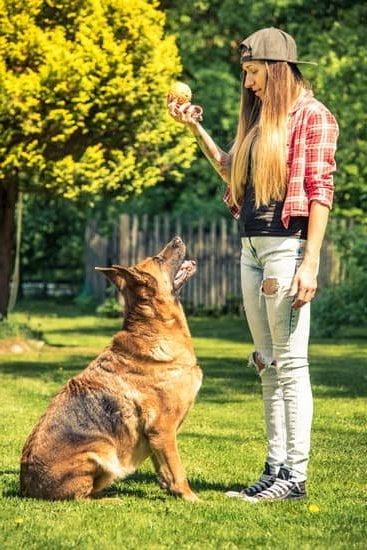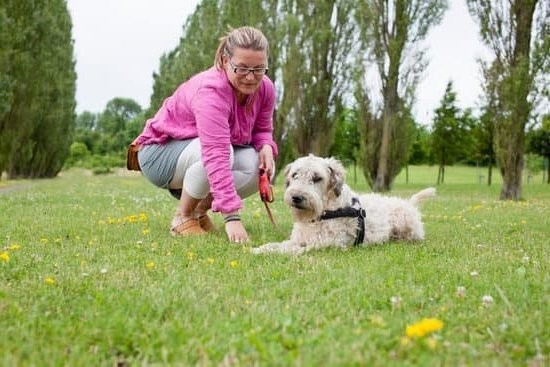When it comes to law enforcement, police dogs play a crucial role in aiding officers in various tasks such as search and rescue, detection of illicit substances, and apprehension of suspects. In the UK, these highly skilled canines are trained through specialized programs and facilities to ensure they are equipped to handle the demands of their duties.
But who trains police dogs in the UK? This article delves into the world of police dog training in the UK, from its history and importance to the qualifications required for trainers and notable organizations that contribute to this field.
The history of police dog training in the UK dates back several decades, with a rich legacy of these loyal companions being utilized in law enforcement operations. Over time, advancements in training techniques and methodologies have contributed to the effectiveness of police dogs in assisting officers in maintaining public safety and security. The evolution of this training has also led to an increased understanding of the integral role that these animals play within the force.
Training programs and facilities dedicated to police dog training are vital for ensuring that these animals are prepared for their duties. From obedience training to scent detection, these programs equip them with the necessary skills needed for their unique responsibilities within law enforcement.
Additionally, qualified trainers play a pivotal role in shaping these remarkable creatures into valuable assets for police work. Their expertise is instrumental in cultivating a strong partnership between the canines and their handlers, resulting in successful collaborations out in the field.
The History of Police Dog Training in the UK
Police dog training in the UK has a long and storied history, dating back to the early 1900s. When police forces began utilizing dogs to assist with law enforcement duties, the need for specialized training programs became apparent. In the early years, police dogs were mainly used for tracking and apprehending suspects, but as their role continued to evolve, so did their training.
The first organized police dog training program in the UK can be traced back to the Metropolitan Police in London. This program laid the foundation for modern police dog training methods and was instrumental in establishing standards and protocols for handling police dogs. Over time, other police forces across the country adopted similar training programs, leading to a standardized approach to police dog training in the UK.
The history of police dog training in the UK is a testament to the dedication and innovation of law enforcement agencies and dog trainers. The evolution of these programs reflects an ongoing commitment to improving the effectiveness and welfare of police dogs, ensuring that they are well-prepared for their crucial roles in supporting law enforcement efforts.
- Early origins of police dog training
- Development of specialized training programs
- Influence of Metropolitan Police on modern training methods
The Importance of Police Dog Training in Law Enforcement
Police dog training plays a crucial role in law enforcement, providing valuable assistance to police officers in various tasks. These highly skilled and trained animals contribute significantly to the effectiveness of police operations, from detecting drugs and explosives to tracking suspects and searching for missing persons.
Contributions to Law Enforcement
The importance of police dog training in law enforcement cannot be overstated. Police dogs are invaluable assets in crime prevention and detection, as they have the ability to cover large areas quickly and efficiently. Their keen sense of smell and hearing enables them to detect illegal substances, firearms, and hidden suspects with remarkable accuracy. In addition, police dogs are also utilized in search and rescue operations, often locating missing individuals in challenging environments.
Enhancing Officer Safety
The presence of a well-trained police dog can help deter offenders from engaging in violent or aggressive behavior towards police officers. By providing an additional layer of protection and support, these animals contribute to enhancing overall officer safety during potentially high-risk situations. Moreover, the mere presence of a police dog can help de-escalate confrontational encounters, leading to peaceful resolutions without the need for physical force.
Building Public Trust
Furthermore, the utilization of properly trained police dogs can also serve to build trust between law enforcement agencies and the community they serve. When deployed appropriately and effectively, these canine partners are viewed as valuable resources that aid in maintaining public safety and upholding the rule of law. As such, investing in comprehensive training programs for police dogs is essential for developing a reliable and respected law enforcement capability within UK communities.
The Role of Police Dog Handlers in the UK
Police dog handlers play a crucial role in the law enforcement agencies of the United Kingdom. These professionals are responsible for the care, training, and deployment of police dogs in various operations. The selection process for police dog handlers is rigorous, as they must possess exceptional handling skills, patience, and understanding of canine behavior. Additionally, they are required to undergo specialized training to effectively work alongside their four-legged counterparts.
In the UK, police dog handlers are assigned to different units such as the K9 unit or the dog support unit within their respective police forces. Their primary duty is to ensure that police dogs are well-trained in obedience, tracking, searching, and apprehension techniques. Moreover, they are also tasked with maintaining the overall health and welfare of their canine partners. This includes regular exercise, grooming, and providing a suitable living environment for the dogs.
The relationship between a police dog handler and their K9 partner is built on trust, respect, and teamwork. Handlers often form strong bonds with their dogs through constant training and working together in high-pressure situations.
They act as advocates for their canine companions both within the force and in public perception. Overall, the role of police dog handlers in the UK is vital in maintaining safety and order within communities while also upholding the welfare of these highly skilled animals.
Training Programs and Facilities for Police Dogs in the UK
Police dog training in the UK is taken very seriously, with specialized programs and facilities dedicated to preparing these canines for their important role in law enforcement. One of the most well-known training facilities for police dogs in the UK is the Metropolitan Police Dog Training Establishment, located in Keston, Kent. This facility provides comprehensive training for both handlers and their canine partners, focusing on obedience, agility, scent detection, and apprehension techniques.
In addition to the Metropolitan Police facility, there are several other training programs and facilities across the UK that cater to police dog training. These programs often employ experienced trainers who have a background in law enforcement or working with animals. The emphasis is not only on teaching the dogs specific commands and tasks but also on socializing them with various environments so they can work effectively in real-world situations.
Furthermore, some police forces have their own dedicated dog training units where both new recruits and experienced handlers undergo regular training. These units play a crucial role in ensuring that police dogs remain effective in carrying out their duties and are equipped to adapt to new challenges as they arise.
The facilities and programs available for police dogs in the UK highlight the commitment of law enforcement agencies to maintaining a high standard of dog training that ultimately benefits public safety.
| Facility | Location |
|---|---|
| Metropolitan Police Dog Training Establishment | Keston, Kent |
| Dedicated Dog Training Units | Various locations across the UK |
Qualifications and Requirements for Police Dog Training in the UK
Training police dogs in the UK requires a specific set of qualifications and requirements for both the dogs and their handlers. Police dog handlers must first be actual police officers before being able to apply for a position as a handler. Once selected, they undergo an extensive training program with their canine partners.
Additionally, police dog trainers must have a thorough understanding of dog behavior, obedience training, scent work, and agility. They often have backgrounds in law enforcement as well as specialized training in canine handling.
For police dogs themselves, there are also specific qualifications and requirements that they must fulfill in order to be considered for law enforcement duty. Typically, police dogs are chosen from specific breeds that are known for their intelligence, physical capabilities, and strong sense of smell.
Common breeds used as police dogs in the UK include German Shepherds, Belgian Malinois, Labrador Retrievers, and Springer Spaniels. These dogs also undergo rigorous training programs that focus on obedience, tracking scents, search and rescue techniques, and suspect apprehension.
Ultimately, the qualifications and requirements for police dog training in the UK are designed to ensure that both the handlers and their canine partners are fully equipped to perform their duties effectively in various law enforcement situations.
| Qualifications | Requirements |
|---|---|
| Police officers with specialized training | Specific breed selection (e.g. German Shepherds or Belgian Malinois) |
| Dog behavior expertise | Rigorous obedience and scent work training program |
| Law enforcement background | Physical capabilities assessment |
Notable Police Dog Training Organizations in the UK
When it comes to training police dogs in the United Kingdom, there are several notable organizations that play a critical role in providing high-quality training and support for these valuable law enforcement companions. Some of the most well-respected organizations include:
- The Metropolitan Police Dog Training Establishment
- The West Midlands Police Dog Unit
- The Sussex Police Dog Section
- The Devon and Cornwall Police Dog Unit
These organizations are dedicated to ensuring that police dogs receive the best possible training in order to effectively assist officers in various law enforcement duties. They focus on developing the dogs’ natural instincts, obedience, and specialized skills required for activities such as scent detection, search and rescue, tracking, and apprehension of suspects.
In addition to training police dogs for specific tasks, these organizations also emphasize the importance of building a strong bond between the dogs and their handlers. This partnership is crucial for effective communication and teamwork in high-pressure situations, ultimately leading to successful outcomes in real-life policing scenarios.
Moreover, these organizations often collaborate with other law enforcement agencies, canine specialists, and experts in animal behavior to continuously improve their training programs and techniques. This ongoing commitment to excellence ensures that police dogs in the UK are well-prepared for their vital roles within law enforcement operations.
Success Stories of Police Dogs in the UK
Police dogs in the UK have played a crucial role in multiple successful law enforcement operations. These highly trained and skilled canines have contributed significantly to solving crimes, capturing suspects, finding missing individuals, and detecting illegal substances.
One success story involves a police dog named PD Finn, who bravely took down an attacker while on duty with his handler. As a result of his valor and dedication to duty, PD Finn’s case led to a change in the law regarding attacks on service animals.
Another remarkable success story involves a police dog named Buster, who was renowned for his extraordinary abilities in detecting explosives. During his career, Buster helped prevent several potential terrorist attacks by uncovering hidden explosives at various locations across the country. His exceptional skills helped save numerous lives and demonstrated the vital role that police dogs play in national security efforts.
Furthermore, there have been instances where police dogs have located missing persons within record time, bringing them safely back to their families. Their keen sense of smell and tracking abilities have been pivotal in swiftly resolving cases of disappearances, providing relief to concerned loved ones. These success stories highlight the invaluable contributions of police dogs to law enforcement and public safety in the UK.
Interview With a Police Dog Trainer in the UK
The Role of a Police Dog Trainer
A police dog trainer plays a crucial role in ensuring that police dogs are properly trained and prepared for their duties in law enforcement. Their primary responsibility is to train and condition police dogs to perform tasks such as tracking suspects, searching for narcotics or explosives, and apprehending criminals.
Additionally, they also work closely with police dog handlers to ensure that the bond between the handler and the dog is strong, and that both are able to effectively work together as a team.
Training Methods and Techniques
During training sessions, police dog trainers use a variety of methods and techniques to teach dogs the necessary skills for their work. These can include obedience training, scent detection, agility training, and bite work. Positive reinforcement is often used to encourage desired behaviors, such as using treats or toys as rewards. Trainers also simulate real-life scenarios to prepare the dogs for situations they may encounter while on duty.
Challenges Faced by Police Dog Trainers
One of the main challenges faced by police dog trainers in the UK is ensuring that their methods align with current laws and regulations regarding animal welfare and training practices. They must also stay updated on new developments in training techniques and technology to ensure that they are providing the best possible training for police dogs. Additionally, building trust and communication with both the dogs and their handlers is essential for successful training outcomes.
Conclusion
In conclusion, the future of police dog training in the UK looks promising as advancements in training programs and facilities continue to improve. The history of police dog training has shown significant progress, with a focus on enhancing the skills and abilities of these valuable K9 units. As law enforcement continues to evolve, so too does the role of police dogs in maintaining public safety.
With the demand for highly trained police dogs increasing, there is a greater need for qualified and dedicated personnel to take on the role of police dog handlers. The qualifications and requirements for training these K9 units have become more rigorous to ensure that only the best handlers are responsible for their care and deployment.
Notable police dog training organizations in the UK play a pivotal role in setting standards and providing support for both trainers and handlers. By recognizing their achievements and success stories, we can highlight the importance of their work in contributing to law enforcement efforts across the country. As we look ahead, it is evident that police dog training will continue to be an integral part of maintaining public safety in the UK.

Welcome to the blog! I am a professional dog trainer and have been working with dogs for many years. In this blog, I will be discussing various topics related to dog training, including tips, tricks, and advice. I hope you find this information helpful and informative. Thanks for reading!





